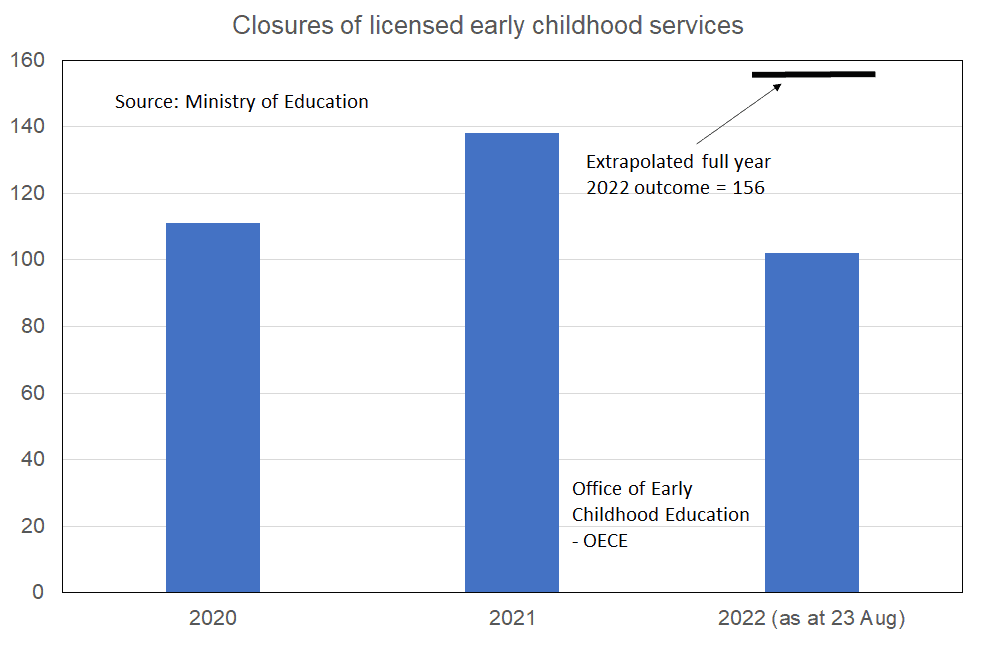Kindergarten funding is to be increased and made higher than other education and care centres.
By Dr Sarah Alexander.
Opinion Editorial.
May 20, 2011.
Kindergarten funding rates for centres owned by Kindergarten Assns are to be different to other similar community-owned early childhood centres (and all other types of early childhood education and childcare services).
The funding change announced in a Fact Sheet issued by the Ministry of Education yesterday afternoon as part of the Budget 2011 release represents a significant departure from the view that kindergartens perform the same function as other education and care centres and are no more, and no less, under the control of government as other centres.
Until now any increases negotiated as part of the Kindergarten Teachers Collective Agreement (KTCA) have been calculated into the funding rates determined by the Ministry of Education for all education and care centres. Some kindergarten associations who found themselves competing with other education and care centres for teaching staff may have felt this was not enough as other centres can pay above the KTCA.
From 1 July 2011 kindergarten association kindergartens are to receive a higher rate of funding per hour per child compared to other education and care services.
| Funding Rates from 1 July 2011 | Kindergartens run by Free Kindergarten Associations | All other Kindergartens and Teacher-led Centres |
| 20 Hours ECE maximum all-day rate | $11.40 (per hour per child all-day rate) | $11.25 (per hour per child all-day rate) |
| 20 Hours ECE maximum sessional/part-day rates | $7.70 (per hour per child sessional rate) | $6.20 (per hour per child sessional rate) |
| Non-20 hours ECE subsidy (up to 30 hours) maximum all-day rate over 2-year-old child | $6.73 (per hour per child all-day rate) | $6.60 (per hour per child all-day rate) |
| Non-20 hours ECE subsidy maximum sessional/part-day rates over 2-year-old child | $6.43 (per hour per child sessional rate) | $4.81 (per hour per child sessional rate) |
| Under 2-year-olds all-day rate maximum | $12.09 (per hour per child all-day rate under 2-year-old) | $11.93 (per hour per child all-day rate for under 2yr old) |
It may argued that
- Kindergartens are being favoured in being given a higher funding rate.
- Or that the separation of kindergartens owned by Kindergarten Associations from other community kindergartens and education and centres for the purposes of a funding is the beginning of a longer term government strategy to drive down the total spend in ECE by telling these other centre types (which tend to have higher operational costs, e.g. rent, than kindergartens) to do more to contain their costs.
How might non-kindergarten association kindergartens contain their costs? Well, salaries/wages is a large component, usually about 70% of the total costs of running an early childhood centre according to past Ministry of Education ECE cost driver surveys. Differentiating out kindergartens owned by Kindergarten Associations from other ECE centres communicates to these other ECE centres to bargain harder with their staff and not allow a flow-on of the Kindergarten Teacher Collective Agreement salary increases to their service (and not to compete with Kindergartens by offering more to their staff than the KTCA).
With special treatment for kindergartens comes the potential for conditions. Kindergartens could be more likely to be treated as public schools in the future, rather than as privately owned (by Associations) community services. They may, for example, be obligated or required to:
- extend national standards into their curriculum, or
- do what ever the government asks such as introduce targeting to low-income, Maori and Pacific families, or
- not charge fees or optional charges on top of the 20 hours ECE subsidy.
It could turn out to be positive for families who want to have more say over the operation of their local kindergarten and want their kindergarten to become more like a public service than one privately controlled by an Association. Who knows? A crystal ball is needed.
Providing different funding rates for Kindergartens vs other types of education and care centres may lead to calls for further categorisations of services for the purposes of setting funding rates, e.g.
- differential funding rates for centres in different regions and cities (e.g. costs tend to higher in say Auckland city, compared to Wellington or Invercargill).
- based on centre size as larger centres especially those who may have a licence for up to 150 children from the 1 July will have considerable economies of scale compared to a service for say 30 children,
- or even based on whether a centre is part of a national chain (and therefore has centralised admin systems etc) or a single locally owned service.









